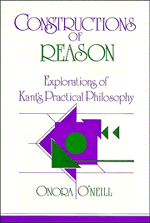Preface
Published online by Cambridge University Press: 05 June 2012
Summary
Kant is revered for his unswerving defense of human freedom and respect for persons, and for his insistence that reason can guide action. He is also reviled for giving a metaphysically preposterous account of the basis of freedom and an intermittently repellent and simultaneously vapid account of human obligations. Many contemporary proponents of “Kantian” ethics want the nicer bits of his ethical conclusions without the metaphysical troubles. They hope to base a “Kantian” account of justice and of rights on broadly empiricist conceptions of self, freedom and action. In these essays I have taken a different tack. I have tried to set Kant's ethics in the context of his own accounts of reason, action and freedom, to argue that these should not be read as a metaphysical extravaganza and to show that his ethical theory is neither pointlessly empty nor relentlessly nasty.
The governing idea behind this reading of the Kantian enterprise is that we must take seriously the idea of a critique of reason. From this almost everything else follows. The very standards of reason will have to be vindicated: If these are neither given nor self-evident, they can have a recursive but not a foundationalist vindication. Philosophy must begin with the task of showing why any standards or procedures for orienting our thinking should have authority for us and count as standards of reason. This initial task is practical: The theoretical enterprise cannot get going unless standards of reason are established.
- Type
- Chapter
- Information
- Constructions of ReasonExplorations of Kant's Practical Philosophy, pp. ix - xiPublisher: Cambridge University PressPrint publication year: 1990



